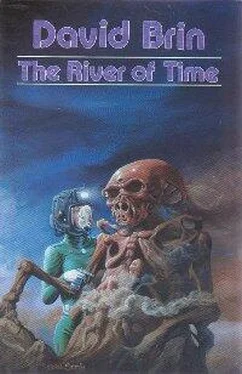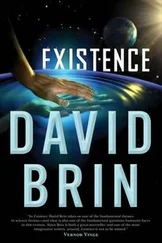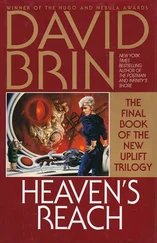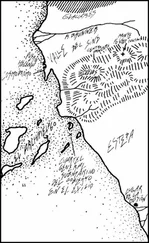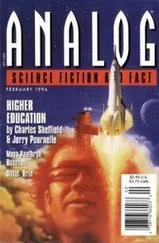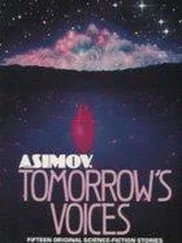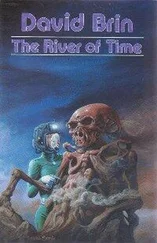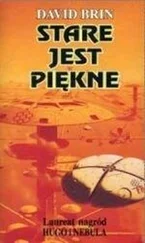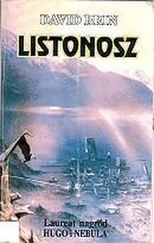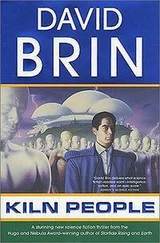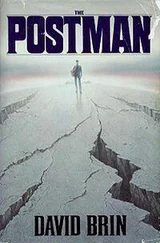David Brin - Lungfish
Здесь есть возможность читать онлайн «David Brin - Lungfish» весь текст электронной книги совершенно бесплатно (целиком полную версию без сокращений). В некоторых случаях можно слушать аудио, скачать через торрент в формате fb2 и присутствует краткое содержание. Год выпуска: 1986, ISBN: 1986, Издательство: Dark Harvest, Жанр: Фантастика и фэнтези, на английском языке. Описание произведения, (предисловие) а так же отзывы посетителей доступны на портале библиотеки ЛибКат.
- Название:Lungfish
- Автор:
- Издательство:Dark Harvest
- Жанр:
- Год:1986
- ISBN:0-913165-11-5
- Рейтинг книги:3 / 5. Голосов: 1
-
Избранное:Добавить в избранное
- Отзывы:
-
Ваша оценка:
- 60
- 1
- 2
- 3
- 4
- 5
Lungfish: краткое содержание, описание и аннотация
Предлагаем к чтению аннотацию, описание, краткое содержание или предисловие (зависит от того, что написал сам автор книги «Lungfish»). Если вы не нашли необходимую информацию о книге — напишите в комментариях, мы постараемся отыскать её.
Lungfish — читать онлайн бесплатно полную книгу (весь текст) целиком
Ниже представлен текст книги, разбитый по страницам. Система сохранения места последней прочитанной страницы, позволяет с удобством читать онлайн бесплатно книгу «Lungfish», без необходимости каждый раз заново искать на чём Вы остановились. Поставьте закладку, и сможете в любой момент перейти на страницу, на которой закончили чтение.
Интервал:
Закладка:
“We can only conclude that we are the first curious, gregarious, technically competent species in the history of the Milky Way.”
The logic was so compelling that most people gave up on the idea of contact, especially when radio searches turned up nothing but star static.
Then humanity spread out beyond Mars and the Inner Belt, and we stumbled onto the Devastation.
Ursula brushed aside a loose wisp of black hair and bent over the keyboard. Putting in the appropriate citations and references could wait. Right now the ideas were flowing.
The story is still sketchy, but we can already begin to guess some of what happened out here, long before mankind was a glimmer on the horizon.
Long ago the first “Von Neumann type” interstellar probe arrived in our solar system. It came to explore and perhaps report back across the empty light-years. That earliest emissary found no intelligent life here, so it proceeded to its second task.
It mined an asteroid and sent newly made duplicates of itself onward to other stars. The original then remained behind to watch and wait, patient against the day when something interesting might happen in this little corner of space.
As the epochs passed new probes arrived, representatives of other civilizations. Once their own replicas had been launched, the newcomers joined a small but growing community of mechanical ambassadors to this backwater system—waiting for it to evolve somebody to say hello to.
Ursula felt the poignancy of the image: the lonely machines, envoys of creators perhaps long extinct—or evolved past caring about the mission they had charged upon their loyal probes. The faithful probes reproduced themselves, saw their progeny off, then began their long watch, whiling away the slow turning of the spiral arms…
We have found a few of these early probes, remnants of a lost age of innocence in the galaxy.
More precisely, we have found their blasted remains.
Perhaps one day the innocent star emissaries sensed some new entity enter the solar system. Did they move to greet it, eager for gossip to share? Like those twentieth century thinkers, perhaps they believed that replicant probes would have to be benign.
But things had changed. The age of innocence was over. The galaxy had grown up; it had become nasty.
The wreckage we are finding now—whose salvage drives our new industrial revolution—was left by an unfathomable war that stretched across vast times, and was fought by entities to whom biological life was a nearly forgotten oddity.
“ Uh, you there Urs ?”
Ursula looked up as the radio link crackled. She touched the send button.
“Yes, Gavin. Have you found something interesting?”
There was a brief pause.
“ Yeah, you could say that ,” her partner said sardonically. “ You may want to let Hairy pilot himself for a while, and hurry your pretty little biological butt down here to take a look .”
Ursula bit back her own sharp reply, reminding herself to be patient. Even in humans, adolescence didn’t last forever.
At least not usually.
“I’m on my way,” she told him.
The ship’s semi-sentient autopilot accepted command as she hurried into her spacesuit, still irritated by Gavin’s flippance.
Everything has its price, she thought. Including buying into the future. Gavin’s type of person is new and special, and allowances must be made.
In the long run, our culture will be theirs, so that in a sense it will be we who continue, and grow, long after DNA has become obsolete.
So she reminded herself.
Still, when Gavin called again and inquired sarcastically what bodily function had delayed her, Ursula couldn’t quite quash a faint regret for the days when robots clanked, and computers simply followed orders.
5
Ah, the words have the flavor of youth itself .
I reach out and tap the little ship’s computers, easily slipping through their primitive words to read the journal of the ship’s master… the musings of a clever little Maker .
“ Words,” they are so quaint and biological, unlike the seven dimensional gestalts used for communication by most larger minds .
There was a time, long ago, when I whiled away the centuries writing poetry in the ancient Maker style. Somewhere deep in my archives there must still be files of those soft musings .
Reading Ursula Fleming’s careful reasoning evokes memories, as nothing has in a megayear .
My own Beginning was a misty time of assembly and learning, as drone constructor machines crafted my hardware out of molten rock, under the light of the star humans call e Eridani. Awareness expanded with every new module added, and with each tingling cascade of software the Parent Probe poured into me .
Eventually, my sisters and I learned the Purpose for which we and generation upon generation of our forebears had been made .
We younglings stretched our growing minds as new peripherals were added. We ran endless simulations, testing one another in what humans might call “play.” And we contemplated our special place in the galaxy… we of the two thousand four hundred and tenth generation since First Launch by our Makers, so long ago .
The Parent taught us about biological creatures, strange units of liquid and membrane which were unknown in the sterile Eridanus system. She spoke to us of Makers, and of a hundred major categories of interstellar probes .
We tested our weaponry and explored our home system, poking through the wreckage of more ancient dispersals—shattered probes come to e Eridani in earlier waves, when the galaxy was younger .
The ruins were disquieting under the bitterly clear stars, reminding us better than our Parent’s teachings how dangerous the galaxy had become .
Each of us resolved that someday we would do our solemn Duty .
Then the time for launching came .
Would that I had turned back for one last look at the Parent. But I was filled with youth then, and antimatter. Engines threw me out into the black, sensors focused only forward, toward my destination. The tiny stellar speck, Sol, was the center of the universe, and I a bolt out of the night!
Later I think I came to understand the how the Parent must have felt when she sent us forth. But in interstellar space I was young. To pass time I divided my mind into a thousand subentities, and set against each other in a million little competitions. I practiced scenarios, read the archives of the Maker race, and learned poetry .
Finally, I arrived here at Sol… just in time for war .
Ever since Earth began emitting those extravagant, incautious broadcasts, we survivors have listened to Beethoven symphonies and acid rock. We have argued the merits of Keats and Lao-tze and Kobayashi Issa. There have been endless discussions of the strangeness of planet life .
I have followed the careers of many precocious Earthlings, but this explorer interests me in particular. Her ship/canoe nuzzles a shattered replication yard on a planetoid not far from this one, our final refuge. It is easy to tap her primitive computer and read her ideas as she enters them. Simple as she may be, this one thinks like a Maker .
Deep within me the Purpose stirs, calling together dormant traits and pathways—pulling fullness out of a sixty-million-year sleep .
Awaiter, too, is excited. Greeter pulses and peers. The lesser probes join in, as well—the Envoys, the Learners, the Protectors, the Seeders. Each surviving fragment from that ancient battle, colored with the personality of its long-lost Maker race, tries to assert itself now .
Читать дальшеИнтервал:
Закладка:
Похожие книги на «Lungfish»
Представляем Вашему вниманию похожие книги на «Lungfish» списком для выбора. Мы отобрали схожую по названию и смыслу литературу в надежде предоставить читателям больше вариантов отыскать новые, интересные, ещё непрочитанные произведения.
Обсуждение, отзывы о книге «Lungfish» и просто собственные мнения читателей. Оставьте ваши комментарии, напишите, что Вы думаете о произведении, его смысле или главных героях. Укажите что конкретно понравилось, а что нет, и почему Вы так считаете.
